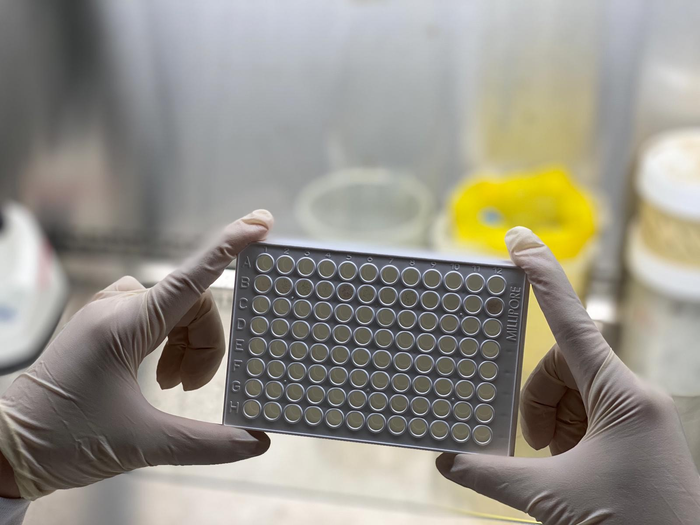Despite their strong effectiveness against SARS-CoV-2, mRNA-based COVID-19 vaccines are associated with adverse post-vaccination effects, such as fatigue; how can this be avoided? In a new study publishing May 31st in the open-access journal PLOS Biology, Ayesa Syenina of the Duke–NUS Medical School in Singapore and colleagues report that a new analysis of blood samples from people vaccinated for COVID-19 has identified distinct molecular characteristics linked to an increased likelihood of post-vaccination fatigue. Additionally, experiments in mice suggest that switching the vaccine injection strategy could potentially ease such adverse effects.

Credit: Christine Tham (CC BY 4.0, https://creativecommons.org/licenses/by/4.0/)
Despite their strong effectiveness against SARS-CoV-2, mRNA-based COVID-19 vaccines are associated with adverse post-vaccination effects, such as fatigue; how can this be avoided? In a new study publishing May 31st in the open-access journal PLOS Biology, Ayesa Syenina of the Duke–NUS Medical School in Singapore and colleagues report that a new analysis of blood samples from people vaccinated for COVID-19 has identified distinct molecular characteristics linked to an increased likelihood of post-vaccination fatigue. Additionally, experiments in mice suggest that switching the vaccine injection strategy could potentially ease such adverse effects.
Adverse post-vaccination effects may influence people’s willingness to get vaccinated or receive a booster dose, hampering efforts to reduce the spread and severity of COVID-19. However, the molecular underpinnings of adverse post-vaccination effects have been unclear.
To improve understanding, Syenina and colleagues analyzed blood samples from 175 healthcare workers who received BNT162b2, the Pfizer-BioNTech COVID-19 vaccine. Specifically, they used the blood samples to analyze a snapshot of each participant’s gene expression, or which genes are turned on or off.
This analysis revealed that people who experienced moderately severe fatigue after vaccination were more likely to have higher baseline expression of genes related to the activity of T cells and natural killer cells—two key cell types in the human immune system.
The researchers also tested two different vaccination injection strategies in mice. Some mice received BNT162b2 through intramuscular injection, the current method used for human patients, in which the vaccine is injected into the muscles. Other mice received a subcutaneous injection, in which the vaccine is injected into tissue just under the skin.
After vaccination, compared to mice that received intramuscular vaccination, mice that received subcutaneous vaccination showed immune-system responses that are in line with a lower likelihood of adverse effects such as fatigue. However, subcutaneous injection did not appear to compromise the protective effects of vaccination.
Further research will be needed to build on these findings and explore their clinical significance. Still, they boost understanding of post-vaccination fatigue and offer a potential strategy to reduce its likelihood.
Coauthor Eng Eong Ooi adds, “This study provides a first insight into the molecular basis of a side effect that many have experienced following mRNA vaccination. We hope that this finding would spur more studies to fully understand the underpinning mechanisms behind vaccine-associated side effects and collectively contribute to developing even more tolerable vaccines.”
#####
In your coverage, please use this URL to provide access to the freely available paper in PLOS Biology: http://journals.plos.org/plosbiology/article?id=10.1371/journal.pbio.3001643
Citation: Syenina A, Gan ES, Toh JZN, de Alwis R, Lin LZ, Tham CYL, et al. (2022) Adverse effects following anti–COVID-19 vaccination with mRNA-based BNT162b2 are alleviated by altering the route of administration and correlate with baseline enrichment of T and NK cell genes. PLoS Biol 20(5): e3001643. https://doi.org/10.1371/journal.pbio.3001643
Author Countries: Singapore
Funding: This study was supported by the National Medical Research Council (NMRC) Open Fund-Large Collaborative Grant (OFLCG19May-0034) and Senior Clinician-Scientist Award (MOH-000135-00) to E.E.O, and the Open Fund-Young Investigator Research Grant (MOH-OFIRG18nov-0004) to R.D.A. The funders had no role in study design, data collection and analysis, decision to publish, or preparation of the manuscript.
Journal
PLoS Biology
DOI
10.1371/journal.pbio.3001643
Method of Research
Observational study
Subject of Research
Cells
COI Statement
Competing interests: The authors have declared no competing interests exists.




